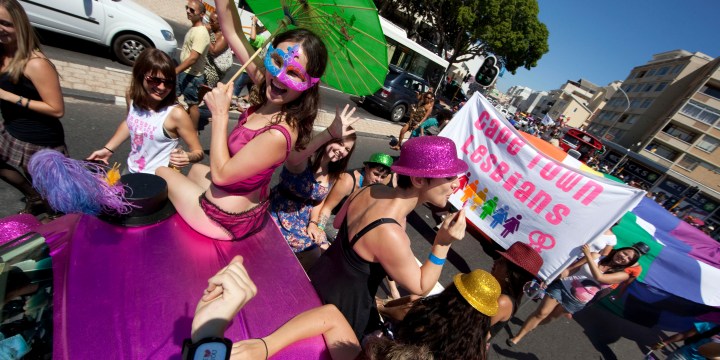Human Rights
Cape Town Pride is a celebration, but there’s still work to be done

The Cape Town Pride parade takes place this Saturday, 26 years after the Mother City held its first Gay Pride, and a year before the country’s first democratic elections. Back then, gay, transgender, bisexual and lesbian people marched under a completely different socio-political climate than today.
The inaugural African Pride had taken place in Johannesburg in 1990. In the early 1990s, same-sex relations were criminalised and same-sex marriages were not allowed.
“Pride was about people’s rights,” says Cape Town Pride festival director, Matthew van As. “It was about ‘visibilising’ a minority.”
When the first march happened in the early 1990s, people had the option of wearing brown paper bags with holes in them so as to hide their identity.
Back then, same-sex relations were criminalised and punishable by up to seven years in jail in terms of repressive apartheid-era legislation. Today, 25 years into democracy, gay rights are enshrined in the Constitution and gay marriage has been legalised, yet “a lot and nothing” has changed, says Jan Richter, the matron at the Pride Shelter, which provides short-term accommodation for queer people.
“There is still a lot of stigma. People are disowned by their families and friends.”
While today, increased visibility is great, it can still have a negative impact because it can make people even more vulnerable to discrimination, says Luiz de Barros, the editor of Mambaonline, an LGBT+ website.
The issues affecting the LGBT+ community today are many. Class, race, nationality and a host of other factors influence how queer people experience their lives.
“A lot of people don’t know how to deal with it (queerness). A lot of people only know of gay and lesbian,” says Richter.
Robyn-Lee Tobias, the chairperson of a campus queer organisation, UCT Rainbow, also thinks there needs to be more work done on gender and sexual orientation both on and off campus.
Richter and Van As agree that one of the biggest issues is acceptance.
“People know you very well (and) then when you come out they don’t want to be your friend any more,” says Richter.
This interpersonal discrimination, coupled with institutional discrimination, can make life even harder for queer people. Although the laws and Constitution in South Africa protect gay rights, the Department of Home Affairs makes it difficult for same-sex couples to get married, transgender people struggle to get their gender markers changed, and refugees fleeing queerphobia in their home countries are not easily able to find refuge here, according to De Barros, who thinks these issues need to be addressed urgently.
As much as Pride is about bringing together queer communities, the festival has been accused in the past of being white and elitist.
“I’ve never been to Pride and I don’t think I want my first one to be the Cape Town (Pride). It’s too white,” says Ayanda Mahlaba, a queer masters student at the University of Cape Town. Tobias has never been to a Pride march, but what she has heard from people who attended that it was “dominated” by white cisgender gay men.
This is why in 2015 the Alternative and Inclusive Pride was launched; it ran in the same week as Cape Town Pride. The Alternative Pride organisers accused the Pride organisers of not being inclusive. They had their own marches and programmes until 2017, though there is no planned march for 2019.
In its mission statement, Cape Town Pride says it’s about being “fully inclusive of all sections of the LGBT+ community”.
Similarly to Cape Town Pride, Joburg Pride has also been accused of not being inclusive. In 2012 Joburg Pride was disrupted by One in Nine members who wanted Pride to have a moment of silence for women who had been killed for their gender and sexuality. The following year the People’s Pride was formed.
The People’s Pride’s manifesto critiqued a number of things about Joburg Pride, among them being “the ways in which Prides across the globe have been formulated, which does not adequately address the issues faced by LGBTI+ people across differences of race, class, gender and geographic location”.
De Barros, who was on the Joburg Pride board from 2006 to 2010, says that even though most Pride events claim to be for transgender people, they are “not as (inclusive) as they should be”.
Van As, however, is adamant that “Pride is always changing and moving towards being an inclusive and diverse festival”.
Even though Pride is about celebrating queerness, Van As says it isn’t strictly for LGBT+ people — “allies are definitely welcome to come”. DM
The Cape Town Pride parade will start at noon at Prestwich Street in De Waterkant and move towards Reddam Field at the Green Point Urban Park on Saturday, 2 March.



















 Become an Insider
Become an Insider